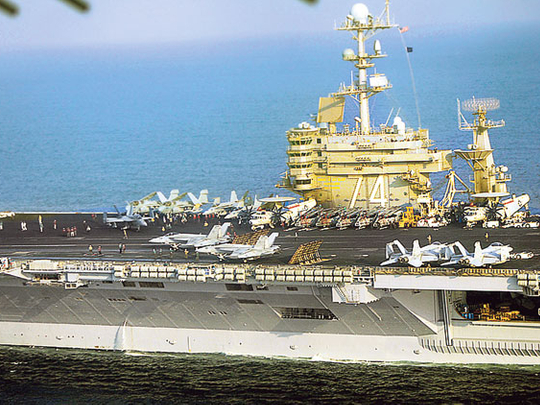
Dubai: The US-Iran war of words over the strategic Strait of Hormuz reflects Tehran's attempt to return to the regional political scene after its image took a beating with the rapidly deteriorating situation in its only Arab ally: Syria, political experts said on Thursday.
While other Arab countries overlooking the Gulf waters have other outlets to export oil, Iran will greatly suffer from exporting to Asian markets in case of Hormuz's closure, analysts said.
"What's going on is a war of statements that is totally related to two [regional] developments," said Mahjoub Zweiri, a Doha-based political expert in Iranian affairs.
"The first one is Iran's attempt to return to the regional political scene following the Arab Spring .... The second thing is the US withdrawal from Iraq, which is widely believed, is 100 per cent under Iranian influence. Iran is trying to tell the world that the Iraqi issue is the thing of past and now the whole region is under it's influence," Zweiri, author of several books on Iran, told Gulf News in an interview.
Iran's Revolutionary Guards yesterday rejected a warning that the US military would "not tolerate" such a closure, saying they would act decisively "to protect our vital interests."
"We have no doubt about our being able to carry out defensive strategies to protect our vital interests — we will act more decisively than ever," said the Guards' deputy commander, Brigadier General Hussain Salami, was quoted by Fars news agency as saying.
"These are empty threats," said Saudi political scientist and columnist Khalid Dakheel of the Iranian threats. "Who would intensify the embargo against itself?"
"The Americans would not take any measures, because the Iranians will not close Hormuz," Dakheel told Gulf News.
"The American threats are not against Iran. They were to relieve Washington's allies and friends in the region," said Iranian analyst Ameer Mousavi in an interview. Yet, Zweiri said that usually ahead of any parliamentary elections in Iran, there is a "storm of statements… that will create a sort of mobilisation with the regime in Iran. The party that will put the US in a more hostile position will attract more supporters." Iran's elections are scheduled to be held after several weeks. Iran, according to military reports, has been capable of closing Hormuz Strait, but it never did, Zweiri noted. He added, such a move will move it from being a "country defending itself to an aggressor in global maritime security", which Iran doesn't seek. An Iranian surveillance plane has recorded video and photographed a US aircraft carrier during Iran's ongoing navy drill near a strategic waterway in the Gulf, the official IRNA news agency reported yesterday.
Iran's ongoing navy drill
An Iranian surveillance plane has recorded video and photographed a US aircraft carrier during Iran's ongoing navy drill near a strategic waterway in the Gulf, the official IRNA news agency reported on Thursday.
The report did not provide details and it was unclear what information the Iranian military could gleam from such footage. But the announcement is an indication Iran is seeking to cast its navy as having a powerful role in the region's waters.
IRNA quoted Iran's navy chief, Adm. Habibollah Sayyari, as saying the action shows that Iran has "control over the moves by foreign forces" in the area where Tehran is holding a 10-day military exercise.
"An Iranian vessel and surveillance plane have tracked, filmed and photographed a U.S. aircraft carrier as it was entering the Gulf of Oman from the Persian Gulf," Sayyari said.











